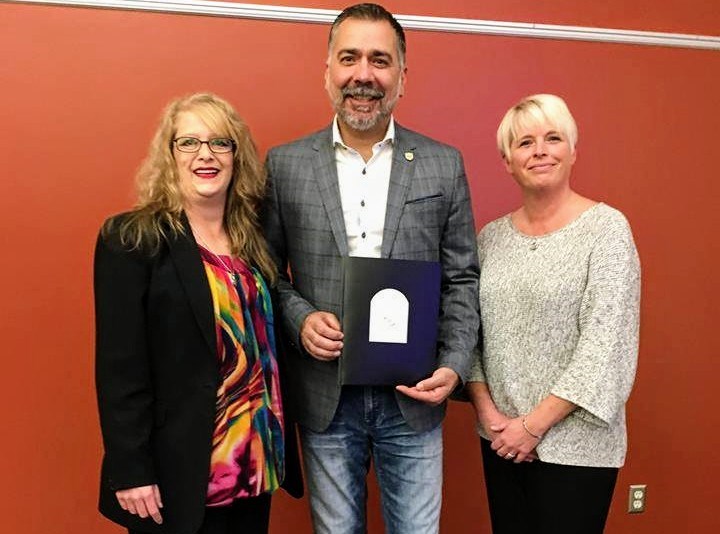Aurora native Lynn Steele is fighting on the frontline and for her fellow personal support workers in a battle that has heated up during the COVID-19 pandemic.
Steele, a longtime personal support worker (PSW) and founder of the Canadian PPE Network (PSWs Partnering Everywhere), was fired recently from an agency job for speaking out about what she says was its “non-existing protocols during COVID-19”.
“I’m hearing that care staff are going in and out of the hospitals, going from job to job, and I said we need to get on top of this,” she said, of the lack of health and safety precautions such as personal protective equipment. “I’m standing up for the workers because they should not be exposed to these things, and the people they’re taking care of shouldn’t be exposed to it either.”
While many community and home health-care companies are providing staff with personal protective equipment such as gloves and surgical masks so they can protect themselves and clients from the spread of the potentially deadly virus, hers was not, and she is not alone, she said.
“Every single PSW on the planet is scared right now. And I get why they’re scared, I feel for every single one of them,” she said. “Would you want to be someone walking around thinking, ‘Oh my God, my patient died this morning from COVID-19, was it me’?”
“With the coronavirus, it’s a very different ball game,” said Steele. “The risk is high to PSWs and the patients we take care of. The PSWs are more concerned about taking care of their patients, and they’re terrified of getting sick themselves and unknowingly transmitting it to the next person they go to.”
Personal support workers help people in their own homes with such things as feeding, lifts and transfers, bathing, toileting, patient monitoring, light housekeeping, and assistance with medication. When certified, they can also be employed in long-term care facilities.
There is currently a critical shortage of these care workers as it becomes increasingly difficult to attract people to an unregulated field that offers low wages, little recognition, and no protected job title, Steele said.
“It’s an unsung profession, and there is a serious shortage of PSWs,” Steele said. “Before COVID-19, everybody knew there was a shortage crisis with personal support workers. Now, we need them more than ever on the front line.”
“All that the frontline workers are asking for after a respectful pay increase that reflects their true value, is to be able to do their jobs safely,” Steele said.
Employers have begun calling out for students studying in the personal care field and those with experience alike to work at nursing homes where resources have been severely strained during the pandemic.
“Urgent need for staffing at an elderly care facility/nursing home with a COVID-19 outbreak,” a March 27 job posting by the Ontario Personal Support Workers Association reads. “The small staff were already infected before anyone was diagnosed and now they are working with a skeleton staff. They are in desperate need of help immediately.”
That help wanted poster is referring to Pinecrest Nursing Home in Bobcaygeon, Kawartha Lakes, where 14 residents have died, and one volunteer.
And as personal support workers join their frontline health-care colleagues across the board in sounding the alarm over the critical shortage of personal protective equipment, particularly masks, the Ontario Hospital Association called on government officials to inform hospitals on when new supplies will be delivered.
The dwindling supplies of such equipment has been described in the current crisis as going to “war without weapons and armour”, and is impacting community hospitals, including Southlake Regional Health Centre, which has launched a community appeal for PPE donations.
It is a concern that’s shared by the provincial personal support workers association.
“PPE supplies are improving and the shortages are an issue of primary concern to the government,” said Ian Da Silva, a spokesperson for the organization. “The recent centralization of the provincial PPE supplies will hopefully work to remedy these concerns in time.”
Da Silva said the outbreak of the coronavirus that causes the respiratory disease COVID-19 has created an even deeper concern for members, one that finds them dropping reporting requirements to appropriate bodies of any changes they observe in their patients, which can be behavioural, physical, and cognitive, and unsafe conditions in the home.
“This is the root of concern for many in this field,” Da Silva said. “During an emergency, it becomes hard to reconcile the need to protect our vulnerable from abuse when heightened demand ultimately inhibits this process.”
For now, Steele said she “applauds” every PSW working in the field during this public health crisis.
“What it seems that is not understood is that we are the ones who are taking care of the frail, the sick and the dying, we are taking care of your parents, and your grandparents, and one day we’re going to be taking care of you,” she said. “And if we can’t figure out a way to bring more PSWs into the field, there’s going to be nobody left to take care of me when it comes time.”



